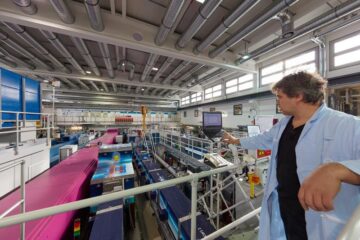High-Dose Vitamin D May Not Be Better than Low-Dose Vitamin D in Treating MS

“We did not find added benefit from high-dose vitamin D over and above ongoing low-dose vitamin D supplementation, but these results need to be confirmed with larger studies,” said Mark S. Stein, MBBS, PhD, FRACP, of The Royal Melbourne Hospital and The Walter and Eliza Hall Institute of Medical Research in Parkville, Australia.
The six-month study involved 23 people with the relapsing-remitting form of MS. All of the participants received low-dose vitamin D (1,000 international units daily) to prevent any vitamin D deficiency. Half of the participants also received high-dose vitamin D2 to elevate their blood vitamin D to high levels (with a target serum 25-hydroxyvitamin D level of 130-175nM). The other half received a placebo high-dose.
MRI scans of the participants’ brains were performed at the start of the study and again after four, five and six months. There was no significant difference between the two groups in the number of new abnormalities that had formed in the brain after six months and no significant difference in the change in the total volume of brain abnormalities.
Four of the 11 people taking the high-dose vitamin D, or 37 percent, had a relapse where their MS symptoms worsened during the study, while none of the 12 people taking only low-dose vitamin D had any relapses.
Stein noted that the study involved people who had MS for an average of six years. “It’s possible that studies of high-dose vitamin D at an earlier stage of MS may lead to different results,” he said.
This study was supported by The Myer Foundation in Melbourne, Australia.
The American Academy of Neurology, an association of more than 24,000 neurologists and neuroscience professionals, is dedicated to promoting the highest quality patient-centered neurologic care. A neurologist is a doctor with specialized training in diagnosing, treating and managing disorders of the brain and nervous system such as Alzheimer’s disease, stroke, migraine, multiple sclerosis, brain injury, Parkinson’s disease and epilepsy.
For more information about the American Academy of Neurology, visit http://www.aan.com
Media Contact
Weitere Informationen:
http://www.aan.comAlle Nachrichten aus der Kategorie: Studien Analysen
Hier bietet Ihnen der innovations report interessante Studien und Analysen u. a. aus den Bereichen Wirtschaft und Finanzen, Medizin und Pharma, Ökologie und Umwelt, Energie, Kommunikation und Medien, Verkehr, Arbeit, Familie und Freizeit.
Neueste Beiträge

Bakterien für klimaneutrale Chemikalien der Zukunft
Forschende an der ETH Zürich haben Bakterien im Labor so herangezüchtet, dass sie Methanol effizient verwerten können. Jetzt lässt sich der Stoffwechsel dieser Bakterien anzapfen, um wertvolle Produkte herzustellen, die…

Batterien: Heute die Materialien von morgen modellieren
Welche Faktoren bestimmen, wie schnell sich eine Batterie laden lässt? Dieser und weiteren Fragen gehen Forschende am Karlsruher Institut für Technologie (KIT) mit computergestützten Simulationen nach. Mikrostrukturmodelle tragen dazu bei,…

Porosität von Sedimentgestein mit Neutronen untersucht
Forschung am FRM II zu geologischen Lagerstätten. Dauerhafte unterirdische Lagerung von CO2 Poren so klein wie Bakterien Porenmessung mit Neutronen auf den Nanometer genau Ob Sedimentgesteine fossile Kohlenwasserstoffe speichern können…





















